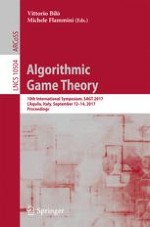2017 | OriginalPaper | Buchkapitel
On Proportional Allocation in Hedonic Games
verfasst von : Martin Hoefer, Wanchote Jiamjitrak
Erschienen in: Algorithmic Game Theory
Aktivieren Sie unsere intelligente Suche, um passende Fachinhalte oder Patente zu finden.
Wählen Sie Textabschnitte aus um mit Künstlicher Intelligenz passenden Patente zu finden. powered by
Markieren Sie Textabschnitte, um KI-gestützt weitere passende Inhalte zu finden. powered by
